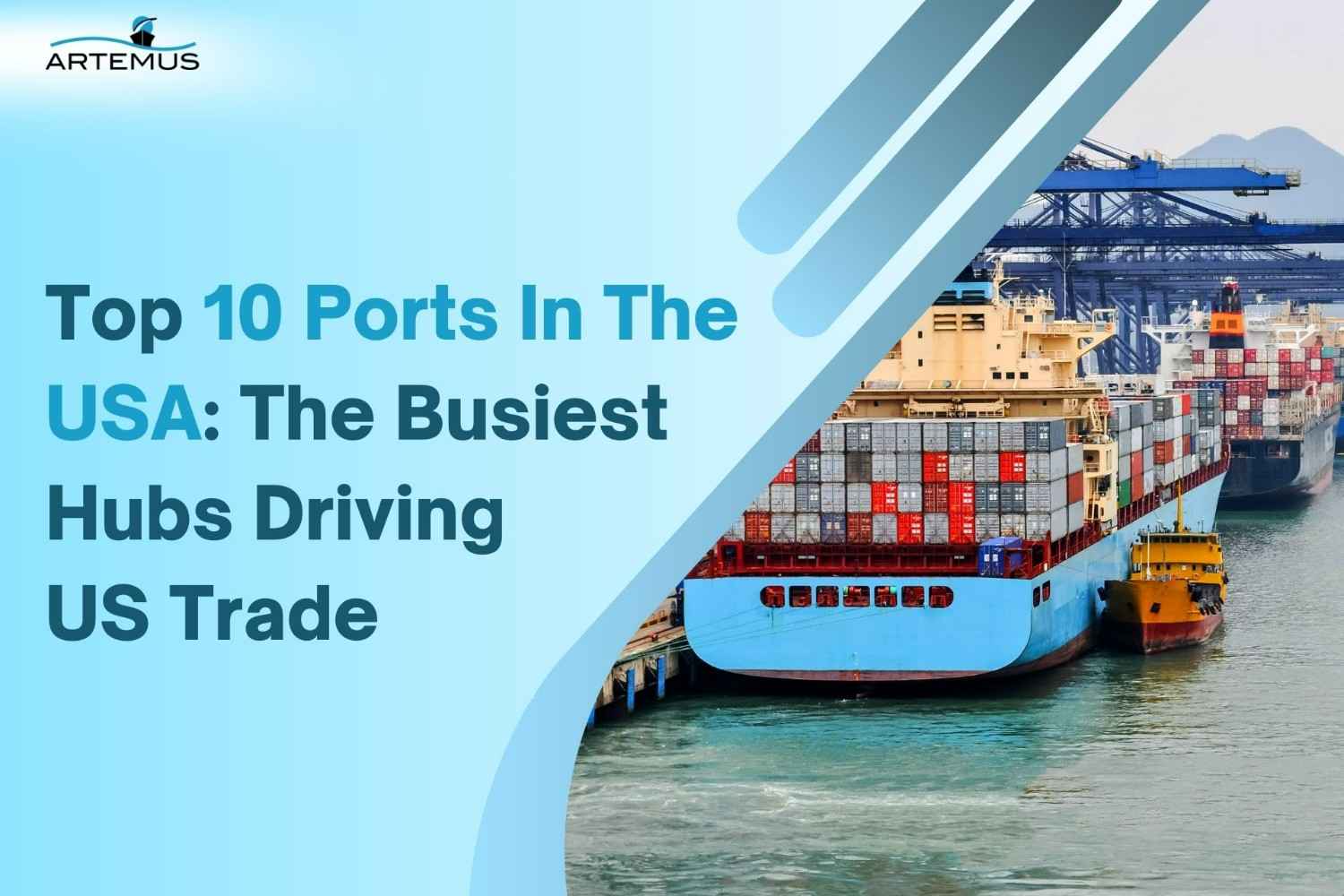
Top 10 Ports In The USA: The Busiest Hubs Driving US Trade
When it comes to international trade, the United States is home to some of the busiest and most important ports

In the expansive world of international trade, the seamless movement of goods across oceans is pivotal for businesses worldwide. At the heart of this intricate process lies Ocean Transportation Intermediary (OTIs), the unsung heroes facilitating smooth sailing between shippers and carriers. OTIs play a pivotal role in orchestrating the complex logistics of sea freight, from booking cargo space to navigating regulatory requirements. With their expertise and industry knowledge, OTIs streamline the shipping process, ensuring timely delivery while minimizing costs and risks for businesses.
Moreover, in this era of digitalization, innovative solutions are revolutionizing how OTIs operate. Artemus Transportation Solution stands at the forefront, offering a specialized software solution tailored for OTIs. With a focus on Importer Security Filing (ISF) and Automated Manifest System (AMS), Artemus empowers OTIs to enhance compliance, streamline documentation processes, and optimize operational efficiency.
Table Of Contents
An Ocean Transportation Intermediary (OTI) serves as a crucial link in the complex web of international trade and shipping. Simply put, an OTI is a middleman or intermediary entity that facilitates the movement of goods between shippers and carriers in the ocean freight industry. These intermediaries play a pivotal role in ensuring the smooth and efficient transportation of goods across international borders via sea routes.
At its core, an OTI acts as a facilitator, coordinating various aspects of the shipping process on behalf of its clients. This includes arranging transportation, handling documentation, navigating regulatory requirements, and providing logistical support. By leveraging their expertise and industry connections, OTIs streamline the shipping process, helping businesses navigate the complexities of global trade.
In the United States, OTIs are regulated by the Federal Maritime Commission (FMC), which oversees licensing, compliance, and dispute resolution within the ocean freight industry. To operate legally, OTIs must obtain appropriate licenses and adhere to strict regulatory standards set forth by the FMC.
Related:NVOCC Software For Streamlined Compliance & Why You Need It?
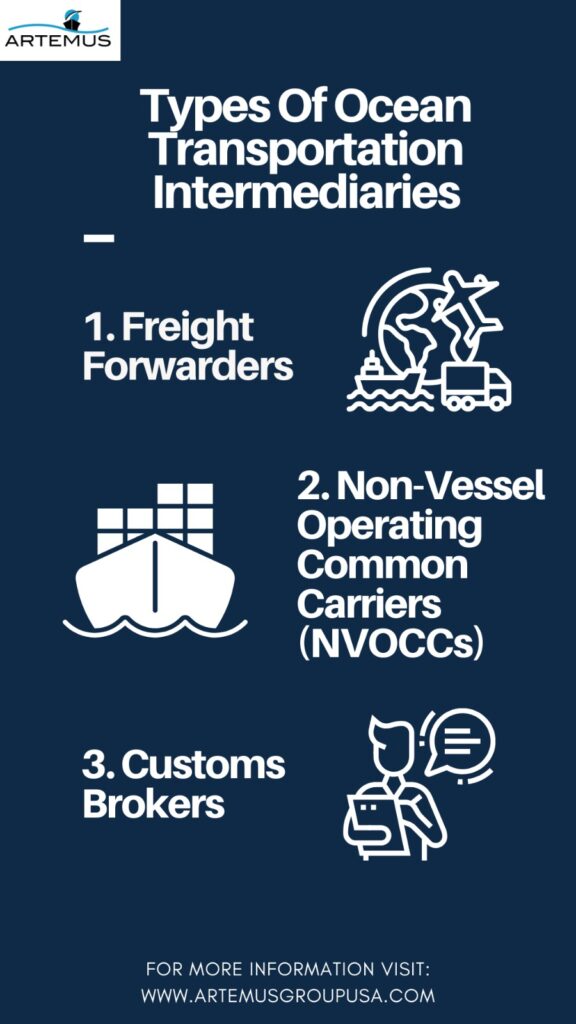
Types of Ocean Transportation Intermediaries (OTIs) encompass a diverse range of entities that play pivotal roles in facilitating global trade by sea. These intermediaries bridge the gap between shippers and carriers, providing essential services to ensure the smooth transportation of goods across international waters. Here are the primary types of OTIs:
Freight forwarders are among the most well-known types of OTIs. They act as intermediaries between shippers and various transportation services, including ocean carriers. Freight forwarders handle a wide array of logistical tasks, such as booking cargo space, arranging inland transportation, preparing documentation, and managing customs clearance. They often provide comprehensive services that streamline the shipping process for their clients, from origin to destination.
NVOCCs are OTIs that operate similarly to freight forwarders but with some key distinctions. Unlike traditional freight forwarders, NVOCCs issue their bills of lading and may own or lease containers for shipping goods. They consolidate cargo from multiple shippers to optimize container space and negotiate favorable rates with ocean carriers. NVOCCs provide a valuable service for shippers by offering flexible and cost-effective shipping solutions without the need for direct contracts with ocean carriers.
Customs brokers play a crucial role in facilitating the clearance of goods through customs checkpoints. While their services are not exclusive to ocean transportation, they are essential intermediaries in the international shipping process. Customs brokers ensure that shipments comply with import/export regulations, handle the necessary paperwork, and communicate with government agencies to expedite the clearance process. They possess in-depth knowledge of customs procedures and tariff classifications, helping shippers navigate complex regulatory requirements efficiently.
Ocean freight consolidators, also known as consolidators or groupage operators, specialize in consolidating small shipments from multiple shippers into larger, more cost-effective loads. By combining shipments destined for the same or nearby destinations, consolidators can achieve economies of scale and negotiate competitive rates with ocean carriers. This allows smaller shippers to access the benefits of containerized shipping without needing to fill an entire container themselves. Ocean freight consolidators provide a valuable service for businesses with smaller shipment volumes, offering cost-effective and efficient transportation solutions.
Related:Customs Compliance Software: Key Benefits & Top Suggestions

Ocean Transportation Intermediaries (OTIs) fulfill a variety of roles and responsibilities in the shipping industry, acting as essential facilitators in the complex process of international trade. Here’s an overview of the key roles and responsibilities of OTIs:
One of the primary responsibilities of OTIs is to arrange shipments on behalf of their clients. This involves coordinating with shippers to determine the most suitable transportation options based on factors such as cargo type, destination, and timeline. OTIs leverage their expertise and industry connections to secure space on ocean vessels and ensure timely delivery of goods to their intended destinations.
OTIs play a crucial role in coordinating logistics throughout the shipping process. This includes arranging inland transportation to move goods from the point of origin to the port of departure, as well as coordinating onward transportation from the destination port to the final destination. OTIs optimize transportation routes and modes to minimize costs and maximize efficiency while ensuring the safe and timely delivery of goods.
Managing documentation is a key responsibility of OTIs to ensure compliance with regulatory requirements and facilitate the smooth flow of goods through the shipping process. OTIs handle a wide range of documents, including bills of lading, shipping invoices, packing lists, customs declarations, and certificates of origin. They ensure that all required paperwork is accurately completed and submitted to relevant authorities in a timely manner.
OTIs assist their clients in navigating customs clearance procedures, which can be complex and time-consuming. They ensure that shipments comply with import/export regulations and assist with the preparation and submission of customs documentation. OTIs communicate with customs authorities on behalf of their clients to expedite the clearance process and minimize delays in the movement of goods across international borders.
OTIs help mitigate risks associated with international shipping, such as damage, loss, or theft of cargo. They provide advice on insurance options and assist clients in obtaining appropriate coverage to protect their shipments during transit. OTIs also monitor shipments closely and proactively address any issues or disruptions that may arise, such as port congestion, vessel delays, or adverse weather conditions.
Providing excellent customer service is another important aspect of the role of OTIs. OTIs serve as trusted advisors to their clients, offering guidance and support throughout the shipping process. They keep clients informed of the status of their shipments, address any questions or concerns, and provide personalized solutions to meet their specific needs. OTIs strive to build long-term relationships with their clients based on trust, reliability, and responsiveness.
Related:NVOCC License Requirements: What You Need To Know
Using Ocean Transportation Intermediaries (OTIs) offers numerous benefits for shippers, helping them streamline their shipping processes, reduce costs, and mitigate risks. Here are some key advantages of utilizing OTIs:
Related: Advantages And Disadvantages Of NVOCC: 10 Key Distinctions

Choosing the right Ocean Transportation Intermediary (OTI) is crucial for businesses involved in international trade, as it can significantly impact the efficiency, cost-effectiveness, and overall success of their shipping operations. Here are some key factors to consider when selecting the right OTI for your business:
Look for OTIs with a proven track record of success and extensive experience in the shipping industry. Research the OTI’s background, including their years of operation, client portfolio, and reputation within the industry. Consider seeking recommendations from trusted partners or industry peers to gauge the OTI’s reliability, professionalism, and ability to deliver results.
Assess the range of services offered by the OTI and ensure that they align with your business’s specific needs and requirements. Look for OTIs that offer comprehensive services, including freight forwarding, customs brokerage, documentation management, logistics coordination, and risk management. A full-service OTI can provide end-to-end solutions that streamline your shipping process and minimize the need for multiple service providers.
Evaluate the OTI’s global network and coverage to ensure that they can effectively support your shipping needs across key trade routes and destinations. Look for OTIs with a robust network of partners, agents, and carriers worldwide, as well as a presence in strategic locations relevant to your business operations. A well-connected OTI can provide you with access to reliable transportation options and expedite shipments to even the most remote locations.
Verify that the OTI has in-depth knowledge of international trade regulations, customs requirements, and compliance standards relevant to your industry and shipping routes. Ensure that the OTI is licensed and accredited by relevant regulatory bodies, such as the Federal Maritime Commission (FMC) in the United States. Additionally, inquire about the OTI’s compliance processes, documentation procedures, and commitment to adhering to legal and regulatory requirements to avoid potential compliance issues or delays.
Assess the financial stability of the OTI and verify that they have sufficient resources and insurance coverage to support your shipping needs effectively. Request information about the OTI’s financial standing, insurance policies, and liability coverage to ensure that your shipments are adequately protected against loss, damage, or other risks. Working with a financially stable OTI helps mitigate the risk of disruptions or liabilities that could impact your business operations.
Evaluate the OTI’s customer service capabilities and communication practices to ensure that they can provide you with responsive and personalized support throughout the shipping process. Consider factors such as accessibility, responsiveness, and communication channels when assessing the OTI’s customer service quality. Choose an OTI that values transparency, proactively communicates updates and changes, and prioritizes your business’s needs and preferences.
Related: What Does A Freight Forwarder Do? Functions & Future Trends
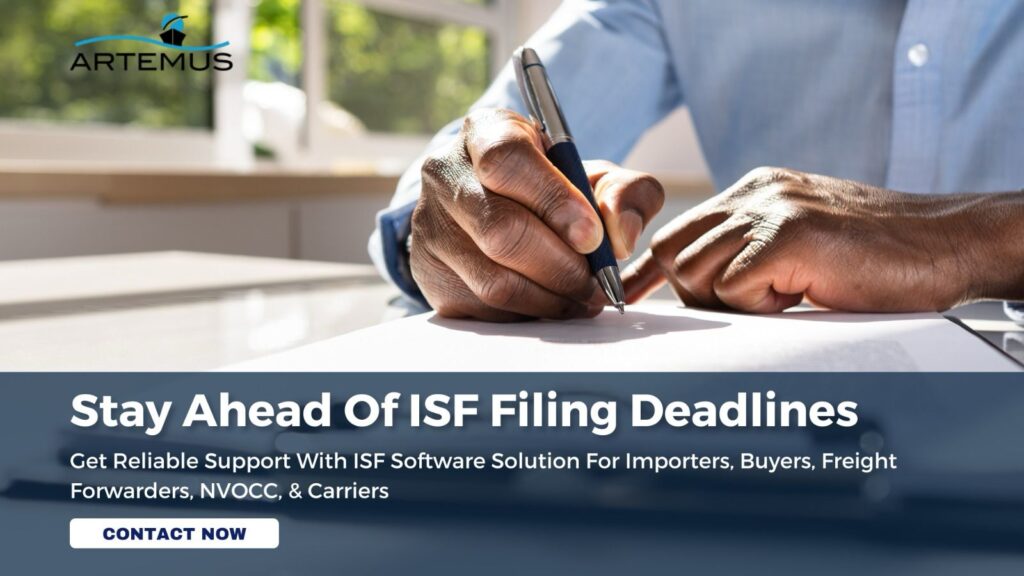
Artemus is a cutting-edge software solution designed specifically for Ocean Transportation Intermediaries (OTIs) to streamline the filing processes for Importer Security Filing (ISF) and Automated Manifest System (AMS). Developed with the unique needs of OTIs in mind, Artemus offers a comprehensive platform that simplifies compliance with regulatory requirements and enhances operational efficiency. Artemus empowers OTIs to stay ahead of regulatory changes, minimize compliance risks, and deliver exceptional service to their clients.
Intermediary transportation refers to the involvement of a third-party entity, such as a freight forwarder or logistics provider, in arranging and facilitating the movement of goods between shippers and carriers, often providing services such as booking cargo space, managing documentation, and coordinating logistics.
OTI stands for Ocean Transportation Intermediary, which is a third-party entity authorized by the Federal Maritime Commission (FMC) to arrange and facilitate the transportation of goods by sea, often providing services such as freight forwarding, customs brokerage, and documentation management.
In logistics, OTI stands for Ocean Transportation Intermediary, which refers to a third-party entity authorized to facilitate the transportation of goods by sea, offering services such as freight forwarding, customs clearance, and documentation management.
The transportation of the ocean refers to the movement of goods via sea routes using ships or vessels, facilitating international trade and commerce between countries across the globe.
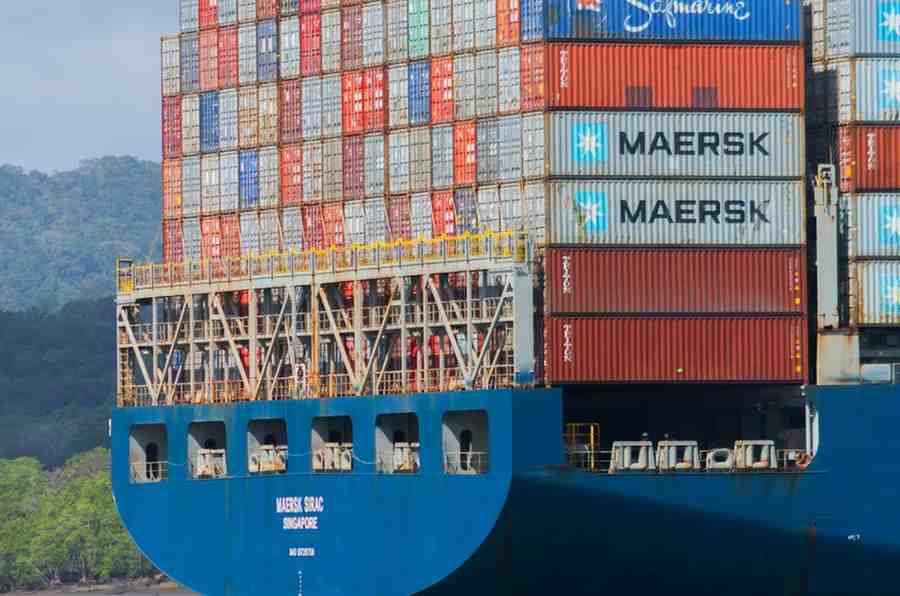
Ocean Transportation Intermediaries (OTIs) serve as indispensable facilitators in the complex ecosystem of global shipping. Their expertise, industry knowledge, and logistical prowess play a vital role in ensuring the smooth and efficient movement of goods across oceans. As businesses navigate the complexities of international trade, OTIs provide invaluable support, streamlining processes, mitigating risks, and optimizing supply chain operations.
Related: How To Find A Customs Broker? 7 Important Factors To Know

When it comes to international trade, the United States is home to some of the busiest and most important ports
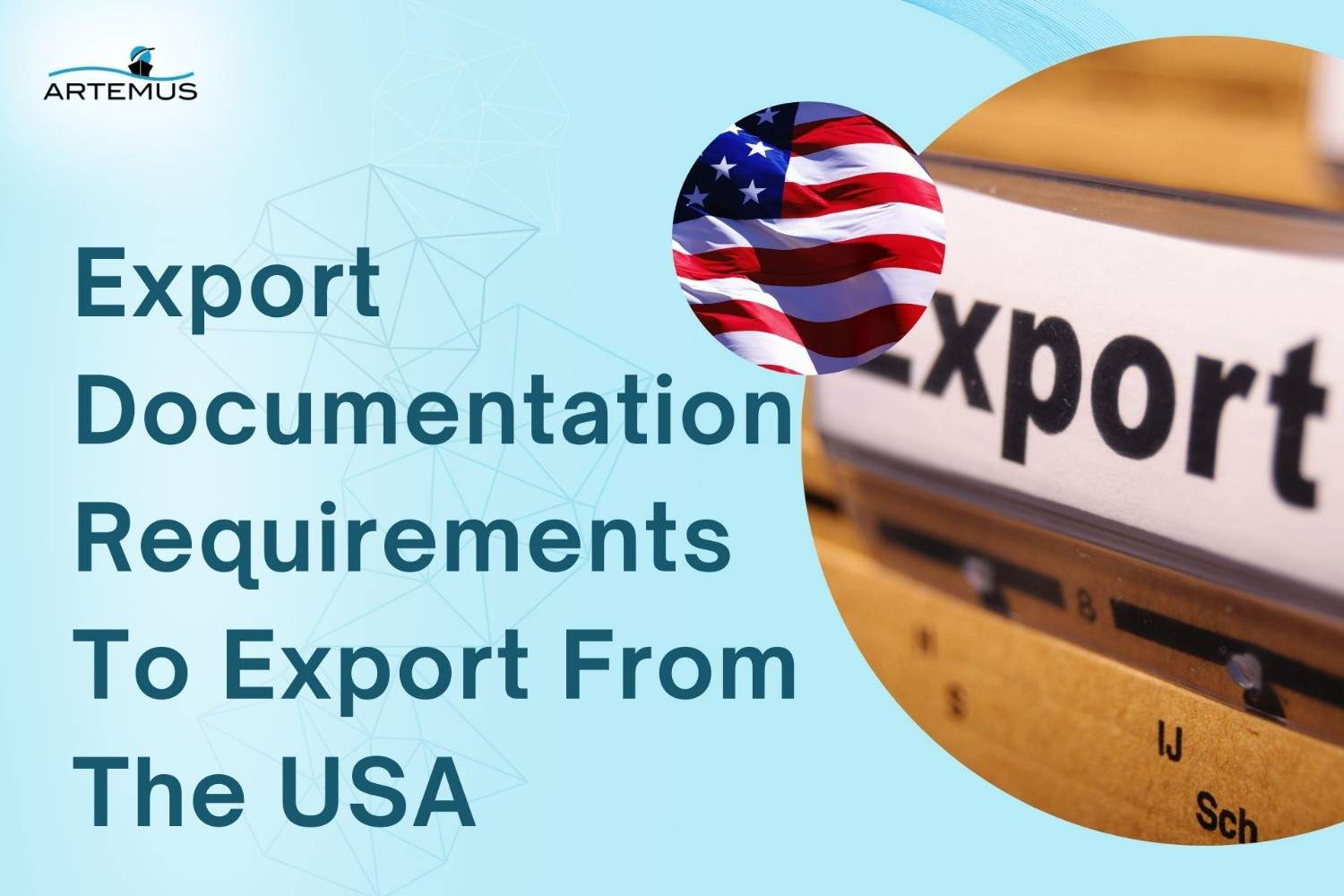
Exporting goods from the USA involves navigating a maze of regulations and ensuring the right documentation is in place. These

Understanding how to export medicine from the USA is a complex and highly regulated process, involving adherence to stringent federal
Get In Touch
Artemus’ Software Solutions for ISF, AMS, Japan AFR, eManifest Canada, & Panama B2B filings.
Get In Touch
Artemus’ Software Solutions for ISF, AMS, Japan AFR, eManifest Canada, & Panama B2B filings.
Notifications